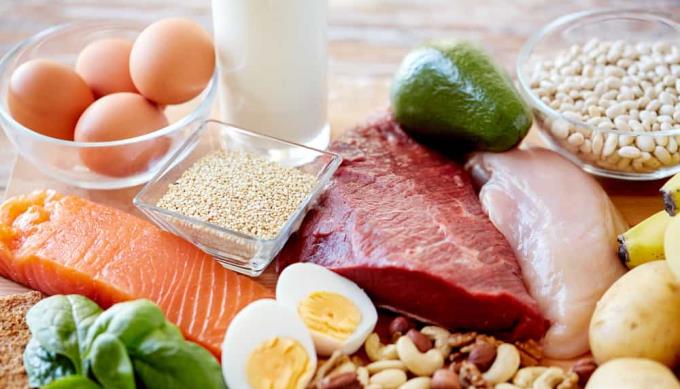Supplementing with DHA for pregnant women not only brings good effects to the fetus in the abdomen, but also helps you prevent certain risks.
DHA (docosahexaenoic acid) is an omega-3 fatty acid commonly recommended for women during pregnancy. Doctors have given DHA supplementation for pregnant women can adequately help fight some complications related to pregnancy , as well as develop better fetus in the abdomen.
You can find DHA in fatty fish and seaweeds or as a supplement. In addition, the body naturally produces small amounts of DHA. In this article, aFamilyToday Health will share 7 benefits of DHA for pregnancy and with that is how to fully supplement this nutrient before your baby is born.
Benefits of DHA supplementation for pregnant women
DHA supplementation for pregnant women will bring many good effects. That is:
1. Preventing postpartum depression
Seafood such as fish, clams, clams, snails ... contains a lot of omega-3 fatty acids EPA (eicosapentaenoic acid) and DHA. These are essential nutrients that are good for the brain. Eating seafood during pregnancy may provide maternal neurological health benefits as research shows a link between low DHA and EPA levels makes women more susceptible to postpartum depression . Therefore, you should consider adding seafood to your weekly menu.
2. Against pre-eclampsia
There is little research on the use of DHA in the prevention of pre-eclampsia . However, in a 2011 study published in the journal Prostaglandin, Leukotrienes and Essential Fatty Acids, of 109 pregnant women, researchers found that women with pre-eclampsia had relatively low DHA levels. Accordingly, this shows that DHA can help protect pregnant mothers against pre-eclampsia, an inherently dangerous condition.
3. Prevent premature birth

According to the Centers for Disease Control and Prevention (CDC), in the US, 12% of babies are born prematurely (born between 22 and 36 weeks of age). Premature babies may require special care and careful monitoring as they are at risk for congenital health conditions.
If you add DHA to pregnant women at the right time, you will reduce the risk of preterm birth. An examination of more than 4,000 women found that absorption of omega-3 fatty acids including EPA and DHA was effective in preventing premature babies.
4. Good for fetal brain
EPA and DHA are involved in the formation of a baby's brain. According to Dr. Elizabeth Ward, a specialist in pregnancy nutrition, the brain uses DHA during the second trimester of pregnancy and continues this process until the baby is two years old.
Therefore, DHA supplementation is essential during pregnancy, breastfeeding and when babies switch to formula. All baby formula brands are supplemented with DHA in varying amounts.
5. Babies are not obese
Status of obesity in children is rising. Although there are many factors that act as triggers, adding DHA to pregnant women can have a positive impact on this issue. A 2018 study published in the American Journal of Clinical Nutrition reported that mothers who supplement about 600mg of DHA during pregnancy give birth to babies with relatively low body fat.
6. Improved apgar index
Doctors made the judgment that if DHA supplementation for pregnant women is sufficient, the baby will be born with apgar index (a test assessing the child's physical health through 5 criteria of skin color, heart rate, reflexes of stimulation, movement and respiration) are high and can cope with stress positively.
7. Good for your child's eyesight
A study of 167 pregnant women was conducted in the Pediatric Department of the University of British Columbia, Canada, found a correlation between visual acuity in 2-month-old babies and DHA intake during the second trimester and pregnancy. third trimester. If you add the right amount, you will help your child develop overall vision.
How much DHA do pregnant women need to supplement?

Although there are no official recommendations for the amount of DHA pregnant women need, a recent study published in the journal Perinatal Medicine concluded that pregnant and lactating women need 200mg of DHA per day.
How to add enough DHA to pregnant women
Because DHA is very important to the health of both mothers and babies, pregnant mothers need to absorb enough DHA during pregnancy through diet or using vitamin supplements. Salmon , canned tuna and products with DHA like eggs and milk are all good options. In addition, you can also add to the menu list dishes made from anchovies, herring, sardines, walnuts and walnut oil.
If you want to add DHA to pregnant women with functional foods, look for a type derived from algae instead of fish oil because it will not cause indigestion of the already sensitive stomach of pregnant women. DHA supplements are currently available in many places, so you can easily find them.
Be careful when eating fish
Fish is an excellent source of DHA, but pregnant and lactating women still need to use caution. Although fatty fish are high in DHA, you are at risk of having a mercury intake. This is an issue that deserves attention. Doctors gave the following advice:
Avoid shark, swordfish, king mackerel, tile fish, and square head fish
Eat some (170g or less per week) of canned or freshly caught longfin tuna
Eat carefully (maximum 350g per week) seafood like shellfish, canned tuna, salmon, pollock and catfish.













